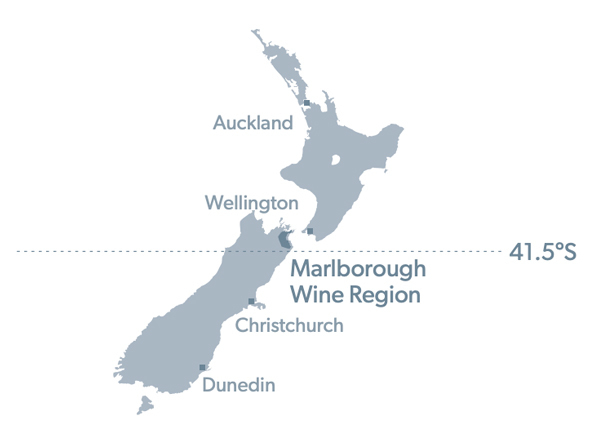
2023 Pinot Noir
Oyster Bay
Marlborough Pinot Noir
Fragrant dark cherry with juicy black plum, elegant and silky.
The philosophy of Oyster Bay is to produce fine, distinctively regional wines that are elegant and assertive with glorious fruit flavors. With every vintage, we are working with more established vines from small vineyard sites, each chosen for its aspect and uniform soils of moderate fertility, providing for extended ripening and enhanced fruit flavor profiles.
With Pinot Noir the fruit is always the primary focus. Each vineyard block is harvested as a separate parcel and treated individually at each stage of the winemaking process. This enables us to tailor traditional winemaking techniques to the wine, providing elegance and complexity. We use a combination of barrel and tank fermentation and mature the wine in a range of new and older French oak. Oyster Bay Pinot Noir is elegant, cool climate Pinot Noir at its best. Fragrant, soft, and flavorful, with aromas of ripe cherries and sweet fruit tannins that provide structure and length.
New Zealand is blessed with two natural attributes that enable it to produce Super Premium wines unlike anywhere else: a maritime cool climate and alluvial soils.
New Zealand’s position in the Pacific Ocean provides a unique, temperate maritime climate. The benefit of a cool climate with long sunshine hours is an extended growing season with a long, slow period of ripening. This allows the well ripened grapes to develop strong, intense varietal characteristics whilst maintaining a balanced, crisp, natural acidity. Over thousands of years the continual process of mountain building and erosion by glaciers, floods, and wind, has deposited alluvial soils on the riverbeds and terraces throughout much of New Zealand. These are the soils in which the vines of New Zealand’s renowned wine regions grow unique, quality grapes.
Marlborough Growing Region
The Marlborough region located at the top of New Zealand’s South Island provides a dry, sunny, but temperate climate, which allows the grapes a long, slow period of ripening spanning from January to April. The clear, cold nights keep acid levels high in the grapes, even when their sugars are rising. These day/night temperature variations are a crucial climatic influence that retains the grapes’ crisp, fresh, vibrant fruit characters.
Soil Type
Brancott and Renwick soils – Pinot Noir is particularly site-specific and responds best to this uniform, moderately fertile, silt overlaying clay loams, with moderate water-holding capacity.
Clonal / Rootstock Selection
A range of predominantly Dijon clones (777, 667, 115 and Abel) selected for their characteristic small, loose bunches and berries which provide concentrated fruit flavors.
Oak Selection
Oak was selected from the Allier, Jupilles, and Tronçais regions in France. The tight grains of this wood are less tannic, more aromatic and provide layers of texture and complexity to the wine. These were seasoned for a minimum two-year period and medium toasted, ensuring no harsh tannins and heightened aromatic potential.
Winemaking Techniques
The fruit was picked from selected vineyard blocks to provide blending components and more complexity to the wine. The fruit was destemmed and crushed directly into a combination of open and closed-top stainless steel fermentation tanks. Following pre-fermentation maceration, the must was inoculated with a range of pure yeast cultures. The open ferment was hand-plunged up to three times a day and a small portion of the blend was run off to complete fermentation in French oak barriques. After 7 days total maceration time, the wine was pressed off into tank and French oak barriques to complete malolactic fermentation. The wine was then matured for 11 months and racked prior to final blending.
Sustainable Winegrowing
As a founding member of Sustainable Winegrowing New Zealand, we are conscious of our environment and we work hard to identify sensitive areas such as wetlands, streams, and native vegetation to ensure that our vineyard practices do not affect the plants and animals that inhabit these areas. We minimize our water usage through our state-of-the-art soil moisture probe technology. We look after our soils by having interrow ground cover plantings, and by spreading our mulch underneath our vines, to provide a botanically diverse ground which encourages beneficial insects into our vineyards.

2023 Marlborough Vintage:
Vintage 2023 delivered hallmark Marlborough aromatics, flavors and refreshing acidity. A true showcase of Marlborough’s famed cool climate viticulture.
| Vineyard Locations: | Wairau Valley and Awatere Valley |
| Vine age: | 7 - 28 years |
| Harvest Date: | March 15 – April 14, 2023 |
Maturity Analysis at Harvest (weighted average)
| Brix: | 22.1 |
| Titratable Acidity: | 8.8g/L |
| pH: | 3.43 |
Wine Analysis
| Alcohol: | 13.5% v/v |
| Residual Sugar: | Nil |
| Titratable Acidity: | 6g/L |
| pH: | 3.6 |

